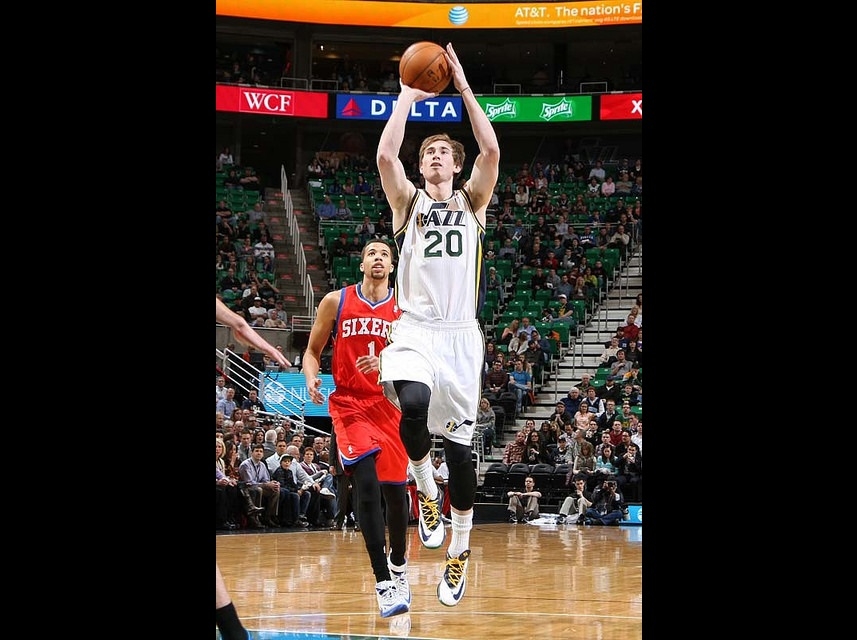
Free agent George Hill is a PG the Twolves might want
SALT LAKE CITY — Teams are lining up to offer Gordon Hayward a max contract when free agency begins Saturday morning. How the Utah Jazz address their point guard situation could affect the All-Star’s decision as much as anything else.
The Jazz can offer Hayward more cash than anyone else, but the seven-year veteran wants to win sooner than later. The Boston Celtics are considered a top suitor after advancing to the Eastern Conference finals with the ability to add two more All-Star caliber players this offseason. The Miami Heat are also expected to be in the mix.
Utah showed it was trending upward with its first 50-win season since 2009-10 and a playoff berth for the first time since 2012. Hayward and Rudy Gobert had career years, but the addition of George Hill gave the Jazz their best point guard production since Deron Williams was traded in 2011.
Hill, however, is a free agent.
“We’re very anxious to tell our story,” Jazz general manager Dennis Lindsey said. “The last two summers, I think people are noticing. We anticipate a very good and interested audience. And obviously a veteran point guard is one of them.”
There are high expectations in Utah for point guards after watching Hall of Famer John Stockton for 19 seasons. That standard continued with Williams before the two-time All-Star and the team had an ugly breakup and he was traded. The Jazz have been looking for consistent play at the position since that split and finally got it last season with Hill, who along with Hayward is a Jazz free agent priority.
Utah has added at least one point guard to the roster every June since Lindsey has taken over, including three in the lottery and trading a pick for Hill. And despite their efforts, the Jazz continue to search for a long-term answer at the position. Trey Burke (No. 9 overall pick), Dante Exum (No. 5) and Raul Neto were all added between 2013-15.
Lindsey traded the No. 12 pick for Hill last June, and he averaged a career high 16.9 points, but struggled with injuries. Utah also drafted Marcus Paige in 2016. The Jazz traded up to draft Donovan Mitchell at No. 12 and selected Nigel Williams-Goss in the second round last week.
It is possible that Serbian point guard Milos Teodosic, among others, could end up in Utah this summer.
“It sounds really similar to when I was transferring to Gonzaga,” Williams-Goss said. “… Like being the quarterback for the Patriots or the pitcher for the Yankees. It’s a very marquee position in their organization. It’s the same here.
“If you haven’t prepared, then maybe the pressure can kind of get to you. I’ve worked my tail off to be ready when my number is called and I don’t see that changing here.”
Mitchell checks all the athleticism and character boxes that appeal to the Jazz. The 6-foot-3 defensive bulldog can play either guard position, but must improve offensively.
Williams-Goss doesn’t have the physical attributes of Mitchell, but had the more productive college career. The 6-foot-3, 190-pounder was the West Coast Conference player of the year, a Bob Cousy Award finalist and Naismith Trophy semifinalist after averaging 16.8 points, 6.0 rebounds and 4.7 assists. He also led Gonzaga to the national championship game.
Oh, and Williams-Goss has the backing of that point guard with a statue out front of the Jazz arena.
Stockton said, “Hey look, I thought he was the national player of the year,” Lindsey noted. “You cannot speed him up. He plays with great pace. He plays with great toughness and character.
“This is the comment I loved the most, ‘He plays like an adult.’ That’s meant a lot to us. That’s what I saw when I saw Nigel.”
The Jazz would prefer Hill to be the point guard of the present and future, but other teams will make a push for his services. This is likely the last major payday for the 31-year-old.
Hill has called Hayward his little brother and said his decision will have an influence. The opposite is likely also true, and the pair had planned to stay in contact at the end of the season.
Lindsey said he’s not feeling the pressure.
“Many times, what happens is, you capitulate to pressure and then you overreach,” Lindsey said. “We want to stick to our fundamentals of team building — mindset, culture, skills, fits, value adds, contract, production.
“We’re quite confident.”










